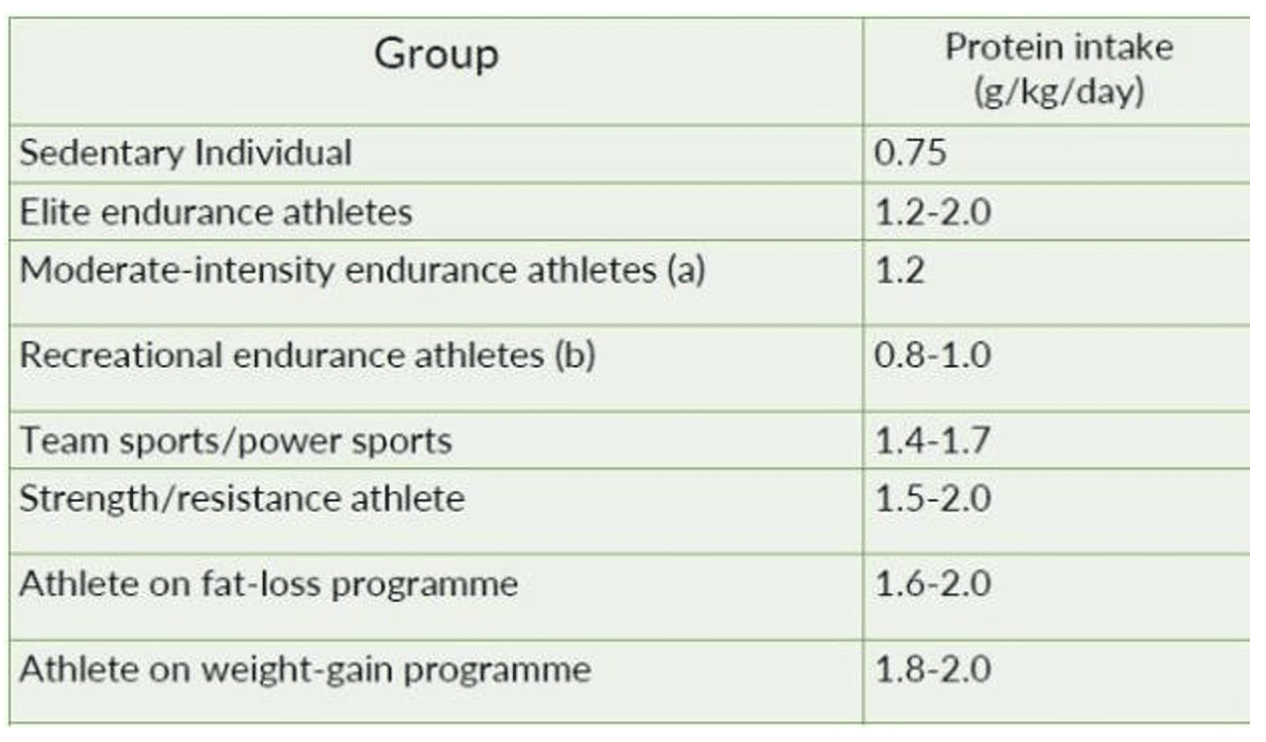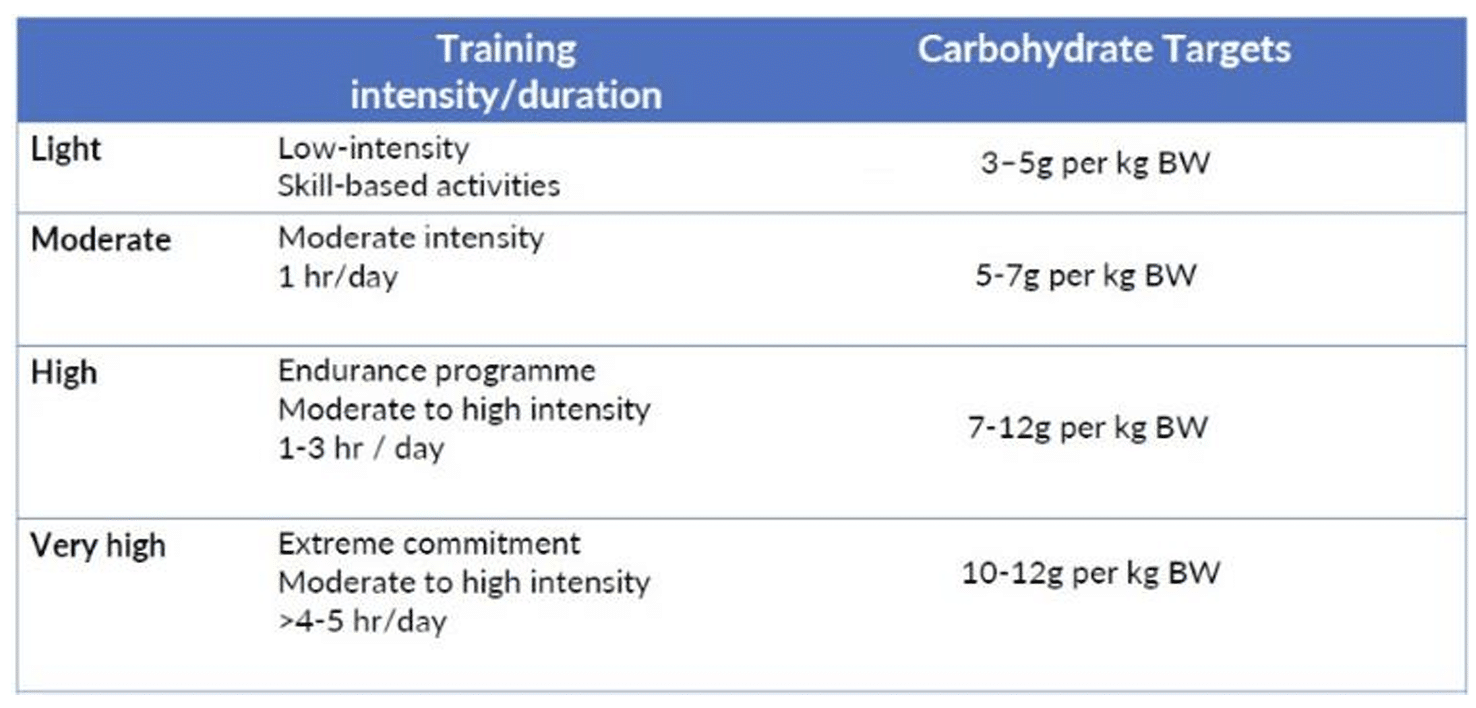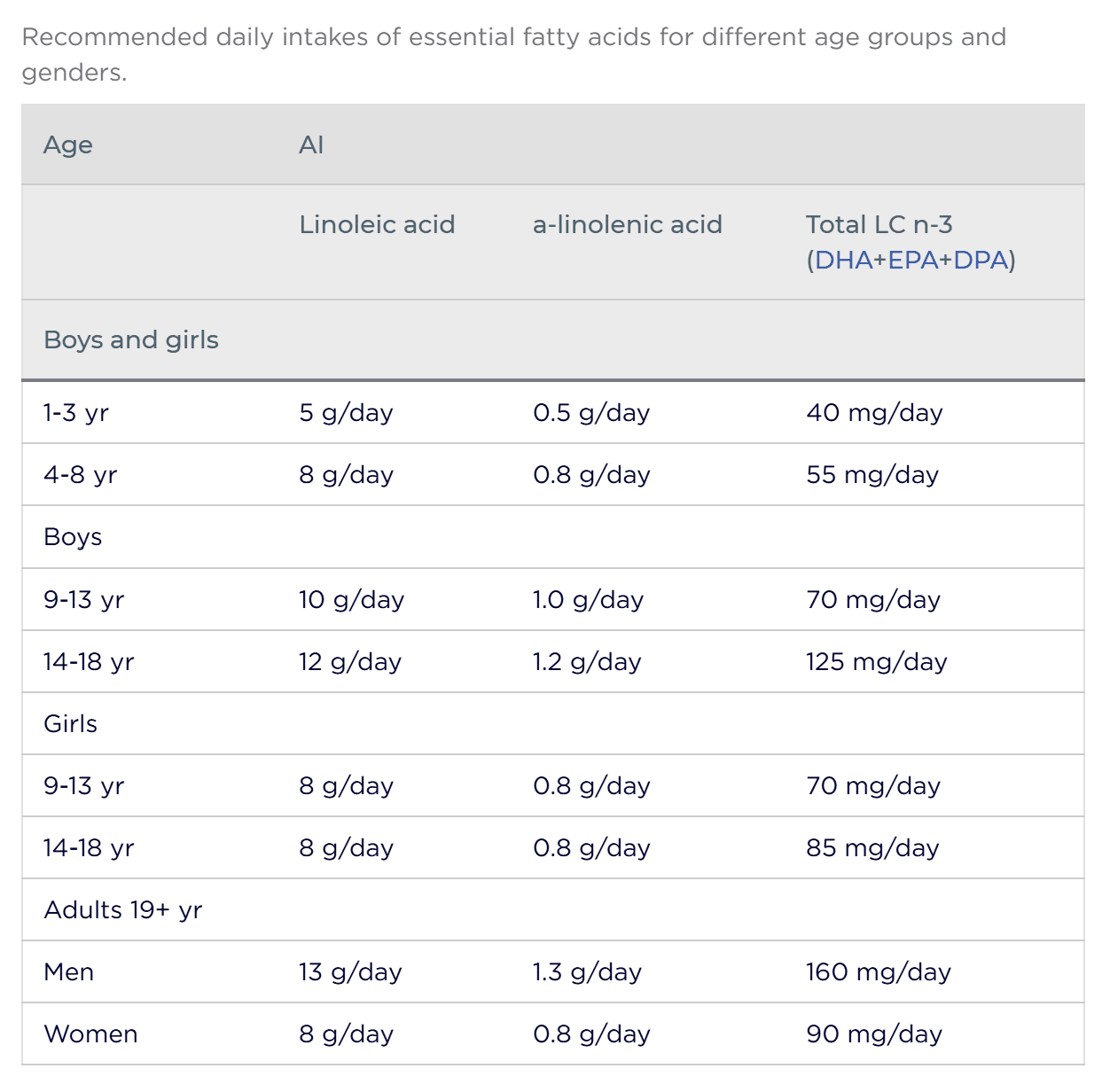The
Basic Nutrients
Macronutrients are carbohydrates, fats and protein. We get our energy from the consumption of these. Water is included as a macronutrient for it's vital role in hydrating our body to support it's many functions.
Micronutrients are essential vitamins and minerals that support functions in our body that keep our body functioning as it should and sustain life.
Protein
Protein is essential for growth, tissue repair and healing injuries. It also plays a role in our immune response and blood clotting. 1 It can also be a source of energy.
Sources: Protein-dense foods include lean meat, poultry, fish, tofu, beans, grains, cereals, nuts and dairy. Vegetables also contain protein and make up about 8% of our protein needs2.
Daily requirements: Protein requirements depend on your goals and lifestyle. At a minimum, you should aim for 0.8g protein per kg of body weight. See below for recommendations for your lifestyle.
What happens if you don’t get enough?
Deficiency of protein can result in:
- heart problems
- muscle soreness
- arthritis
- cramps
- hair loss
- loss of sleep
- muscle deterioration
- poor wound healing
Be careful of too much protein – this can cause kidney issues for some people3.
Protein for your lifestyle


Carbohydrates
Carbohydrates are a main source of energy for the body. Beneficial especially for energy for brain function.
Sources: The healthiest sources of carbohydrate include those that are also rich in fibre. Aiming for wholefoods such as fruits and vegetables, legumes and lentils, nuts and wholegrains is recommended over foods with added sugars and fats such as pastries, and sweets.
Daily requirements: There is no recommended intake of carbohydrate except for children4. The focus on carbohydrate here is the choice of carbohydrate being a healthy form as mentioned above. Some people may be intolerant to carbohydrate, and a reduced amount is recommended. Both fats and proteins also provide an energy source to the body so carbohydrates are not the only source.
What happens if you don’t get enough?
Carbohydrates are not strictly required, as fats and proteins also provide a source of energy to the body. Therefore issues from a deficiency of carbohydrate arises in the absence of a balanced diet5. If this is the case the following could occur6:
- heart arrhythmias and other heart issues
- sudden death
- osteoporosis
- kidney damage
- increased cancer risk
- impairment of physical activity and
- lipid abnormalities
If a diet lacks in carbohydrate it can be assumed it can also lack in fibre.
Carbohydrate for your lifestyle


Minerals
Minerals act as a catalyst for many processes in the body to get started. Minerals we need include: calcium, magnesium, phosphorus, sodium, potassium, chloride, iron, zinc, iodine, fluoride, selenium, copper, chromium and manganese. Minerals are involved in the formation of bone and teeth, activating muscle contraction, transmitting messages via the nervous system, regulating hormones, and enables formation and functioning of red blood cells so that they can move oxygen around the body.
Sources: We get minerals though all food groups but they are in particular abundant in dairy, meat, fruits and vegetables (especially green leafy vegetables), nuts, fish, and eggs. Your body cannot produce minerals on it’s own so we must get this from food.
Daily requirements: Some we need in larger amounts (major) and others in smaller amounts (trace). The amount we need for each specific mineral varies. But a varied diet provides us with a good balance. For your specific needs click here.
What happens if you don’t get enough?
Conditions and symptoms of mineral deficiency are varied and extensive given the number of minerals and their role in the body.
Minerals of most concern are Calcium, Iron, Iodine, Magnesium, and Zinc15
- A deficiency of major minerals (calcium, magnesium, and phosphate) is connected with osteoporosis (associated with falls and fractures), cardiovascular events, and neuromuscular dysfunction16
- A deficiency of trace minerals, including iron, zinc and selenium, can result in poor oxygen transportation, immune issues, and can contribute to anaemia, delaying wound healing16.
Fibre
Dietary fibre is a component of plants. They are defined as either soluble fibre and insoluble fibre. Insoluble fibre helps move bulk through our intestines, and keeps our intestinal acid levels balanced, and feeds good bacteria Soluble fibre slows down the emptying of our stomach, binds with fatty acids and slows down sugar absorption. Fibre can also lower cholesterol levels, and plays a role in maintaining a healthy weight and preventing colorectal cancer.
Sources: Fibre is found in plant matter which includes fruits, vegetables, legumes and whole grains. There is more fibre in a food if it is less processed as much of fibre is found in skins, and husks of these foods.
Daily requirements: The recommendation for men is 30g of fibre per day and 25g per day for women. The recommendations differ for children, and for lactating or pregnant women. See the advisory here.
What happens if you don’t get enough?
A diet deficient in enough dietary fibre is linked to an increased risk of:
- diabetes type II, stroke, colon and rectum cancer, and ischemic heart disease12
Other signs of deficiency include:
- constipation, digestive concerns, imbalance of the gut microbiome which impacts absorption of nutrients.
Fats
Fats are the most energy-dense nutrient. Their functions include providing energy, essential fatty acids, and helping to transport and absorb fat-soluble vitamins. Fats also play a role in hormone production.
Sources: We find fats in fish, meat, poultry, nuts, dairy products, eggs, cooking oils and spreads, grains, and fruits and vegetables such as avocados. The healthiest forms of oils are monounsaturated and polyunsaturated. These include olive oil, sunflower, canola and peanut oil, and foods high in omega fatty acids (such as fish). The fats of concern are trans fats and saturated fats especially for their effect on our cardiovascular system in particular.
Daily requirements: There is a recommended daily intake of polyunsaturated fats7. There isn’t for monounsaturated as these can be manufactured by the body. The recommendation however is to have no more than a third of our energy intake from fats. See the link to a chart below for the RDI for polyunsaturated fats.
What happens if you don’t get enough?
If we do not get enough of the good fats in our diet we may suffer from8 9 10 :
- Vitamin deficiencies of fat-soluble vitamins, which can result in: Haemorrhagic Syndrome, osteopenia and muscle weakness (K), night blindness, dry eyes, anaemia, impaired immunity (A), bone disease such as osteoporosis and rickets, muscular weakness (D), and Neuropathy and impaired night vision, leading to dementia and ophthalmoplegia (E)
- Related to the deficiency of essential fatty acids (EFA’s) – dry, scaly rash, hair loss, hair depigmentation, poor wound healing, growth restriction in children, increased susceptibility to infection11
Fat Recommendations


Water
Water is an absolute essential for life. Our cells need to be hydrated to perform their functions. It is absolutely essential for every function of our body, including digestion, thermoregulation, detoxification, joint lubrication, nutrient transportation, organ health and metabolism.
Sources: 20% of our water comes from solid food intake. The rest we mostly take in through what we drink14.
Daily requirements: Daily requirements vary depending on age, gender, activity levels, pregnancy (and lactating) and salt intake. But generally, women should aim for 2.1L and men should aim for 2.6L.
What happens if you don’t get enough?
- dehydration
- heat stroke
- headaches
- mental fatigue
- kidney damage and stones
- in severe cases, urinary tract cancer, colon cancers, heart issues, and death may occur
- dark urine
- dry skin
- thirst
- hunger
- constipation
Vitamins
The main function of vitamins is to regulate biochemical activity in the body. It is especially important to brain function, wound healing, skin and bone health, immune health, brain function and energy functions. Vitamins are either water soluble or fat soluble. For a full list of functions for each vitamin click here.
Sources: Vitamins are found in all food groups in varying quantities. To get all essential vitamins a diet that includes a variety from all four groups is necessary. Some foods are fortified with vitamins to support an increase in their consumption. But there are specific vitamins that we need to focus on because we often don’t get enough of these. Specifically, Vitamin A and C.
Daily requirements: Requirements vary by vitamin and depend on a person’s age, gender and lifestyle. Click here for your personalised requirements. Special note that some people especially children, pregnant or lactating women should seek medical advice for their requirements
What happens if you don’t get enough?
Conditions and symptoms of vitamin deficiency are varied and extensive given the number of vitamins and their role in the body. Systems that are mostly commonly affected by deficiency are the skin, eyes, blood, the digestive tract and the nervous system.
The two vitamins most Australians don’t get enough of are A and C. Vegans need to take special note of getting enough B12 (by supplementation).
Vitamin deficiencies of fat-soluble vitamins can result in the following conditions but these conditions are slower to develop 8 9 10. Water-soluble vitamins are required in our diet daily and deficiency may result in:
- Haemorrhagic Syndrome, osteopenia and muscle weakness (K)
- Night blindness, dry eyes, anaemia, impaired immunity (A)
- Bone disease such as osteoporosis and rickets, muscular weakness (D)
- Neuropathy and impaired night vision, leading to dementia and ophthalmoplegia (E)
- Healing issues, scurvy (C)
- Pregnant women should ensure they get enough folate to avoid birth defects such as Spina Bifida (Folate B9)
- A deficiency of B vitamins can cause fatigue, weakness, skin rashes, cardiovascular issues, memory concerns, dementia, anaemia and seizures13.
Alcohol
Alcohol is not necessary for the human body and can cause many problems including malabsorption of nutrients that impact multiple systems. There is no completely safe intake of alcohol.
Recommended intake for adults only: No more than 10 standard drinks in 1 week. No more than 2 drinks per day17
References:
- https://www.health.harvard.edu/nutrition/high-protein-foods-the-best-protein-sources-to-include-in-a-healthy-diet
- https://www.eatforhealth.gov.au/nutrient-reference-values/nutrients/protein
- https://www.mayoclinichealthsystem.org/hometown-health/speaking-of-health/are-you-getting-too-much-protein
- https://www.eatforhealth.gov.au/nutrient-reference-values/nutrients/carbohydrate
- https://ajcn.nutrition.org/article/S0002-9165(23)06195-6/fulltext
- Bilsborough SA, Crowe TC. Low-carbohydrate diets: what are the potential short- and long-term health implications? Asia Pac J Clin Nutr. 2003;12(4):396-404. PMID: 14672862.
- https://www.eatforhealth.gov.au/nutrient-reference-values/nutrients/fats-total-fat-fatty-acids
- https://academic.oup.com/bmb/article-abstract/67/1/149/33037
- https://pmc.ncbi.nlm.nih.gov/articles/PMC11242131/
- https://pmc.ncbi.nlm.nih.gov/articles/PMC11242131
- chrome-extension://efaidnbmnnnibpcajpcglclefindmkaj/https://med.virginia.edu/ginutrition/wp-content/uploads/sites/199/2014/06/Parrish-June-17.pdf
- https://pmc.ncbi.nlm.nih.gov/articles/PMC10131147/
- https://www.healthdirect.gov.au/vitamin-b-deficiency
- https://www.eatforhealth.gov.au/nutrient-reference-values/nutrients/water
- https://www.betterhealth.vic.gov.au/health/healthyliving/Vitamins-and-minerals#types-of-minerals-and-their-functions
- https://www.mdpi.com/2072-6643/17/3/454
- https://www.eatforhealth.gov.au/food-essentials/fat-salt-sugars-and-alcohol/alcohol